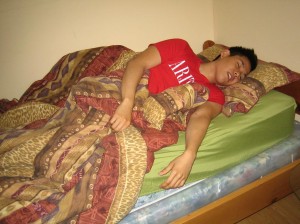Sleep apnea is a disorder in which the breathing is oftentimes blocked or partly disrupted during sleep. It can be mild to severe, based on how often the lungs do not get enough air and this happens from 5 to more than 50 times an hour.
The most common type of sleep apnea is the obstructive sleep apnea and the less common type is called central sleep apnea which occurs among those who had stroke, heart failure, brain tumor and infections.
It is important to note that sleep apnea can be caused by blocked or narrowed airways in the nose, mouth or throat. The airways can be blocked when the throat muscles and tongue relaxes during sleep.
Sleep apnea can also occur if the individual has large-sized tonsils. During the day when awake, the tonsils do not cause any problems, but when lying down at night, they can press down on the airways, thus making it narrow and can cause sleep apnea. Sleep apnea can also occur when there is problem with the jawbone and being overweight.

Symptoms of sleep apnea
- Waking with an unrefreshed feeling after sleep, problems with memory and concentration, feeling tired and experiencing changes in personality.
- Excessive daytime sleepiness.
- Morning or night headaches
- Always waking up during night to urinate
- Heartburn or a sour taste in the mouth during night time
- There is swelling of the legs along with sweating and chest pain while sleeping
- Not feeling rested after a night’s sleep and feeling sleepy during the day
Symptoms of sleep apnea in children
- Always snoring and can be hyperactive as well as problems in paying attention during the day.
- Becoming restless during sleeping and always waking up and problems with bed wetting.
Children are not sleepy during the day, but the only symptom of sleep apnea among children is that they do not grow as quickly just like with other children similar to their age.
Causes of sleep apnea
- Obstructive sleep apnea can occur if there are deformities in the bone or enflamed tissues in the nose, throat or mouth.
- Drinking alcohol which affects parts of the brain that controls breathing. It will relax the breathing muscles and cause the narrowing of the airway.
- Some fat found in the neck area can press down on the tissues around the airways. This will cause narrowing of the airways and can cause sleep apnea.
- Taking some medications for conditions such as allergies, long-term pain, insomnia and anxiety. These medications can relax the muscles and tissues found in the throat and causing it narrow down.
Treatment and home remedies
- If possible, the individual should cut down weight.
- Minimize the consumption of alcohol and taking medications such as sleeping pills or sedatives before sleeping since it will make the symptoms worse.
- Get plenty of sleep since sleep apnea becomes frequent when the individual was not able to get enough sleep.
- Stop smoking.
- Immediately treat breathing problems such as a stuffy nose that is caused by colds or allergies. You can register for first aid training to learn measures to manage allergies or colds.
- Raise the head of the bed about 4 inches high or use a cervical pillow to help keep the head stay in a position that minimizes sleep apnea.